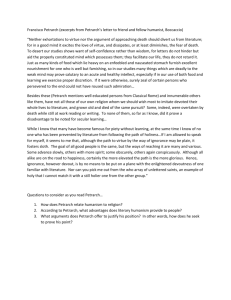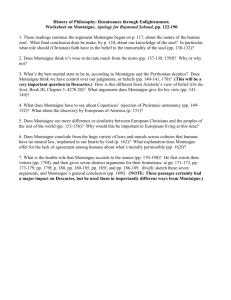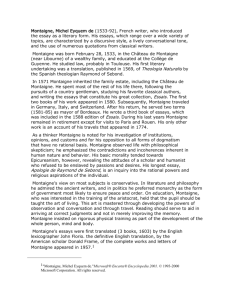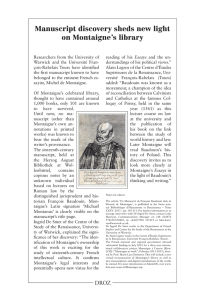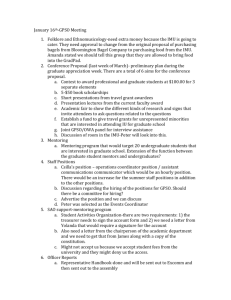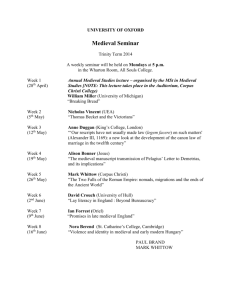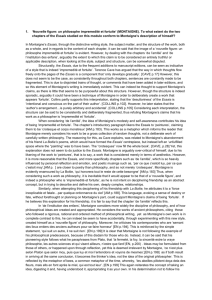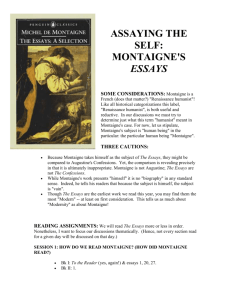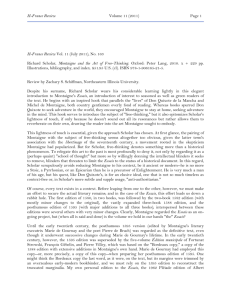Winter 2012 (Word document)
advertisement
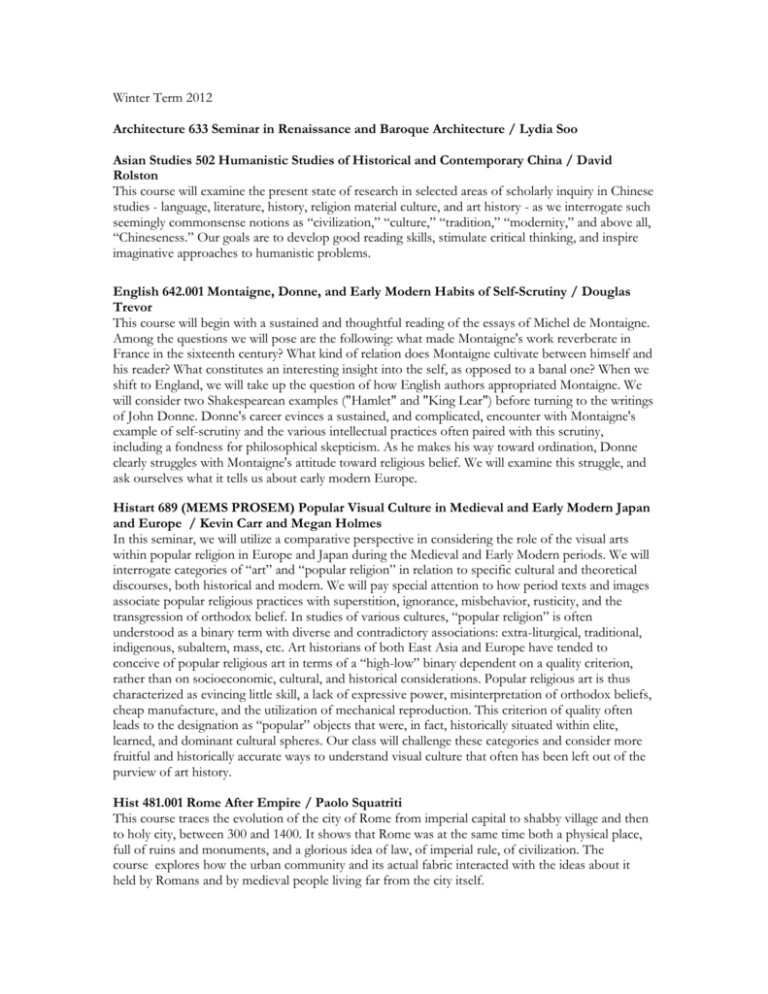
Winter Term 2012 Architecture 633 Seminar in Renaissance and Baroque Architecture / Lydia Soo Asian Studies 502 Humanistic Studies of Historical and Contemporary China / David Rolston This course will examine the present state of research in selected areas of scholarly inquiry in Chinese studies - language, literature, history, religion material culture, and art history - as we interrogate such seemingly commonsense notions as “civilization,” “culture,” “tradition,” “modernity,” and above all, “Chineseness.” Our goals are to develop good reading skills, stimulate critical thinking, and inspire imaginative approaches to humanistic problems. English 642.001 Montaigne, Donne, and Early Modern Habits of Self-Scrutiny / Douglas Trevor This course will begin with a sustained and thoughtful reading of the essays of Michel de Montaigne. Among the questions we will pose are the following: what made Montaigne's work reverberate in France in the sixteenth century? What kind of relation does Montaigne cultivate between himself and his reader? What constitutes an interesting insight into the self, as opposed to a banal one? When we shift to England, we will take up the question of how English authors appropriated Montaigne. We will consider two Shakespearean examples ("Hamlet" and "King Lear") before turning to the writings of John Donne. Donne's career evinces a sustained, and complicated, encounter with Montaigne's example of self-scrutiny and the various intellectual practices often paired with this scrutiny, including a fondness for philosophical skepticism. As he makes his way toward ordination, Donne clearly struggles with Montaigne's attitude toward religious belief. We will examine this struggle, and ask ourselves what it tells us about early modern Europe. Histart 689 (MEMS PROSEM) Popular Visual Culture in Medieval and Early Modern Japan and Europe / Kevin Carr and Megan Holmes In this seminar, we will utilize a comparative perspective in considering the role of the visual arts within popular religion in Europe and Japan during the Medieval and Early Modern periods. We will interrogate categories of “art” and “popular religion” in relation to specific cultural and theoretical discourses, both historical and modern. We will pay special attention to how period texts and images associate popular religious practices with superstition, ignorance, misbehavior, rusticity, and the transgression of orthodox belief. In studies of various cultures, “popular religion” is often understood as a binary term with diverse and contradictory associations: extra-liturgical, traditional, indigenous, subaltern, mass, etc. Art historians of both East Asia and Europe have tended to conceive of popular religious art in terms of a “high-low” binary dependent on a quality criterion, rather than on socioeconomic, cultural, and historical considerations. Popular religious art is thus characterized as evincing little skill, a lack of expressive power, misinterpretation of orthodox beliefs, cheap manufacture, and the utilization of mechanical reproduction. This criterion of quality often leads to the designation as “popular” objects that were, in fact, historically situated within elite, learned, and dominant cultural spheres. Our class will challenge these categories and consider more fruitful and historically accurate ways to understand visual culture that often has been left out of the purview of art history. Hist 481.001 Rome After Empire / Paolo Squatriti This course traces the evolution of the city of Rome from imperial capital to shabby village and then to holy city, between 300 and 1400. It shows that Rome was at the same time both a physical place, full of ruins and monuments, and a glorious idea of law, of imperial rule, of civilization. The course explores how the urban community and its actual fabric interacted with the ideas about it held by Romans and by medieval people living far from the city itself. History 594 /Judaic 517 Ancient Judaism: Law, Religion, History / Rachel Neis This course provides an introduction to Ancient Judaism from the first to the eighth centuries. We will focus on the history, law and religion of ancient Jews of Palestine and the Diaspora, who lived in Roman, Christian, Persian and Zoroastrian contexts. You will have the chance to read selections from the Mishnah, the Talmud, the New Testament and the writings of the Early Church Fathers, among other sources in translation. Information for graduate students: Graduate students will at times have slightly different or additional reading assignments and presentations. Our graduate theme this semester is "Ancient Jewish Law." History 698 Political Theology / Hussein Fancy This seminar will offer a thorough reading of texts that have either inspired or reflect a renewed interest in Political Theology or to put it differently, the study of the theological origins of modernity. In particular, we will examine how a particular periodization -- the division of the premodern from the modern -- has authorized ideas about the sovereign state, autonomous individual, religion, and violence that underpin contemporary cultural theory. Readings include: Carl Schmitt, Ernst Kantorowicz, Hans Blumenberg, John Millbank, Philippe Buc, Andrew Cole, Jonathan Sheehan, Giorgio Agamben, and Ernesto Laclau. Italian 486/660 Petrarch / Karla Mallette In this course, we will study Petrarch’s Canzoniere, the most influential poetic work in late medievalearly modern Europe. No knowledge of Italian necessary; the course will be taught in English, though we will use a bilingual edition and will discuss the structure of the poetry in the original. Topics will include Petrarch’s treatment of time; the elusive beloved and the omnipresent poet-lover; prosodic forms – sonnet, canzone, sestina, etc. – and the ways in which the aural texture of the poem contributes to (or undermines) its meaning; musical performance of Petrarch’s poetry in early modern Europe; Petrarch’s autograph manuscript of the Canzoniere – how he himself saw his poetry; Petrarch’s treatment of ancient myths, in particular the figures of Orpheus and Ulysses; Petrarchism through the ages, from early modernity to the lyrics of contemporary pop music. For graduate credit, students will be required to write a research paper and lead a class session on a topic of their choice. Italian 533 / meets with Italian / MEMS 333 Dante’s Divine Comedy / Alison Cornish This course is dedicated to a guided reading of the Divine Comedy in its entirety. The text will be read in facing-page translation for the benefit of those who know some Italian and those who do not. Lectures and discussion are in English. Students will learn about the historical, philosophical, literary context of the poem as well as how to make sense of it in modern terms. In addition to participation in lectures, graduate students will be expected to prepare secondary readings for each class in addition to cantos assigned. An outside meeting for discussion of these materials will be arranged. Graduate students can substitute writing projects for exams. Musicology 643 Early Modern Singers, Arias, Productions: Collaboration c. 1700/ Louise Stein This seminar is devoted to exploring the intersections between the history of singing and the history of musical theater, with particular attention to the ways in which singers shaped the production and composition of opera around 1700. We will learn about singers’ lives and how they sang, study the operatic market place, the development of the "star" system, the da capo aria, the travels of opera, and how singers collaborated with composers and others in the production process. The seminar will include work with primary sources as well as modern editions and readings from books and articles on reserve or on C-Tools. Students will be introduced to various kinds of primary sources--archival documents, printed libretti, manuscript musical scores, and so on. The repertory will include operas and arias by Alessandro Scarlatti and other late seventeenth-century composers, as well as operas and oratorios by G. F. Handel. Philosophy 460 Medieval Philosophy / Tad Schmaltz This course focuses on three leading figures of this period: Augustine (354–450), who attempted to reconcile a broadly Platonic outlook with an emerging Christian orthodoxy; Thomas Aquinas (1225– 1274), who attempted to reconcile an entrenched Christian theology with an Aristotelian philosophy that was just becoming available in the West; and William of Ockham (1287–1347), who was a prominent defender of a nominalist/conceptualist outlook that deviated from more traditional Platonic and Aristotelian views. Topics for discussion include the compatibility of pagan philosophy with religious revelation; the problem of universals; the nature of time and eternity; the possibility of knowledge of the nature and existence of God; problems involving evil, human freedom, and divine foreknowledge; and the nature and destiny of human beings. Spanish 459 Don Quijote y la formación de la novela moderna / Enrique Garcia SantoTomas Estudiaremos la obra maestra cervantina desde una perspectiva contemporánea, centrándonos en su contexto socio-político, histórico y literario, e incorporando acercamientos críticos que se adapten a nuestra sensibilidad moderna. Prestaremos particular atención a la imbricación de géneros en el texto, analizando igualmente sus reverberaciones míticas y simbólicas. Nos enfocaremos en la construcción de los personajes más significativos, haciendo parada en temas como el de la ley y la violencia, la vida marginal, los espacios urbanos y rurales, la sexualidad latente o abierta, y los usos y significados de la violencia y el cuerpo. La clase será en español. Spanish 488 Las Novelas ejemplares de Miguel de Cervantes / Enrique Garcia Santo-Tomas El presente curso explorará la colección completa de novelas cortas cervantinas en su contexto histórico, social y literario, indagando, en última instancia, en la relevancia estética de estas pequeñas obras maestras. Brujas, lunáticos, perros, putas y gitanos serán los mejores amigos del estudiante en su recorrido por la España que conoció Cervantes y de la que escribió “liberalmente” para entretenernos en el siglo XXI. *Por cada clase ausentada el estudiante perderá un punto de la nota final. Sólo se permiten ausencias por festividades religiosas o enfermedad (con nota médica como justificante). MEMS 898 Dissertation (Etc!) Colloquium / George Hoffmann This workshop provides advanced students in Medieval and Early Modern periods with the opportunity to present work in a interdisciplinary context bringing together participants from all the disciplines that engage with pre-modern materials. The colloquium supports students in commitments that they have already undertaken, with the small, but pleasurable responsibility of responding to colleagues’ work. It addresses three needs: 1) to help you to frame and to convey the larger significance of your research with the help of a supportive group from a wider range of methodological points of view than would normally appear on a dissertation committee; 2) to provide you with practice in articulating your ideas in an oral format; and 3) to explore how interdisciplinary dialogue can enrich our research. The MEMS colloquium is an integral part of the Graduate Certificate Program in MEMS, but students do not need to be admitted to the Certificate Program to take the course. The course will meet regularly on a schedule to be determined by the needs of the group; you may register for 1-3 credit by permission of the instructor (graded S/U).
